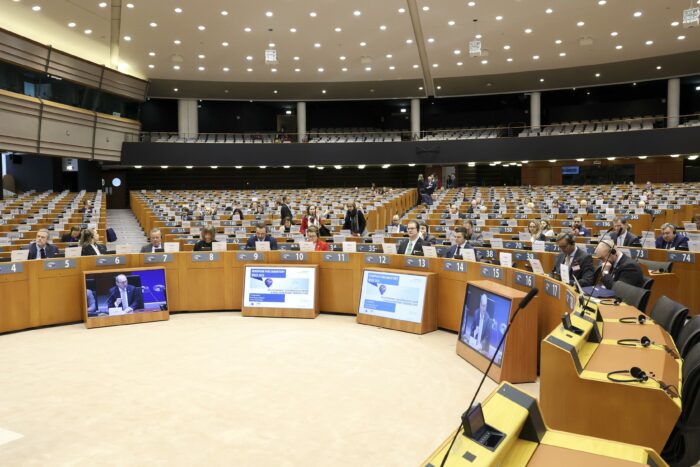The Progressive Post
Clear head and nerves of steel – the dilemma of reforming our fiscal rules

As fears of a recession make fiscal policy ever more relevant, we need to discuss reforming economic governance rules. Many of the Commission’s good intentions fail to achieve what they set out, leaving us with a fiscal architecture that is pro-cyclical and unreliable, hindering the green and digital transitions and economic growth.
After three years without the application of the EU’s fiscal rules, their return and proposed reform are coming to the forefront of the economic and political debate. As the obsession with interest rates turns into early signs of an economic slump and with the slow execution of Recovery and Resilience Plans still in the works, national budgets will once again be called upon to save the day. After supporting families and firms through the worst of the inflationary crisis, it will be time for fiscal policy to provide counter-cyclical expansion. This will be important to boost demand and lift growth. It will be crucial to bolster supply, invest in the green and digital transitions and finance an industrial strategy capable of delivering disinflation. After all, as the Roosevelt Institute has shown, it is an expansion of supply and not the dampening of demand that has made disinflation happen in the US.
Like in the interregnum between the 2008 and 2011 crises, our ability to deliver counter-cyclical fiscal policy is contingent on market vigilance and the expectations policymakers set concerning the likelihood of reform. The calendar is frightfully short and already the mistakes of yore are returning: just a few weeks ago, the Finance Ministers of Germany, Luxembourg, Austria, Switzerland and Liechtenstein made an untimely call for budget discipline. This is the fruit borne of the seed sowed by EU and OECD bureaucrats who, amid an inflationary crisis, blamed wages, not profits, and wanted to wean middle classes and businesses off economic support.
Progressives are thereby thrown between a rock and a hard place – we ought not to take any bad deal, but some reform just cannot wait. The Commission’s proposals to reform fiscal rules come from a good place, but their intentions simply don’t come through. While a shift from annual targets to multiannual plans should provide important flexibility, and, importantly, democratic changes of government will allow changes in plans, the ban on ‘backloading’ leaves governments very little wiggle room, for example, to deliver fiscal consolidation after economic growth. The intention to abandon ‘unobserved variables’, such as output gaps, fails as we continue to depend on historically unreliable Debt Sustainability Analyses (DSA), similarly based on obscure and unobserved assumptions. The think tanks Dezertnat Zukunft and Instituut voor Publieke Economie have provided a useful illustration of how DSA vary wildly in their projections for debt to GDP over time (figure 1). This unreliability is worsened by the uncertain impact on spending and interest rates of climate change, as well as the defence risks on Europe’s eastern flank. One welcome step would be, beyond ownership of expenditure plans, to allow member states the ‘first-move’ to propose their own DSA and welcome parliamentary scrutiny of this instrument.
Figure 1
Source: European Commission, Dezerenat Zukunft and Instituut voor Publieke Economie
Of course, none of these even touch on the worst underlying point. When it comes to replacing budget balance for spending benchmarks, policymakers are sleepwalking with alarming consensus into a ‘narrative strait’. If the relatively arbitrary and inflexible 60 per cent debt cap and the 3 per cent deficit cap have hounded progressives for years, pushing many squarely into fiscal conservatism, what will happen when the political discussion becomes about limiting expenditure? It would be bad enough that literally no citizen can understand what is ‘net primary expenditure’, shutting down fiscal debates too important to be left in the hands of bureaucrats.
But it gets worse. Supporters will say the Commission’s proposed expenditure rule excludes interest rates and cyclical unemployment spending and allows for discretionary revenue increases. But how many governments will explicitly raise taxes to raise spending? What about revenue increases that are neither cyclical nor discretionary? In recent years, these revenue windfalls have come from tax bases, such as wage growth, outpacing GDP growth and more recently from inflation. In Portugal and Spain, some of the few Socialist governments left, these revenues have been redistributed to improve public services and provide support to families and firms in need. In practice, the proposed reform would not allow this anymore, reinforcing Europe’s penchant for small government.
This is, of course, not only a political point. If the last 10 years have shown anything, it is that expanding growth is a far more successful strategy for reducing debt than austerity. The IMF, not known for its leftism, concluded as much in its April 2023 World Economic Outlook. When all technical estimates suggest this would be the path member states would have to take should the new proposed rules apply, we should return to the question: are these new rules counter-cyclical enough? Or perhaps, more poignantly, if they do not work to bring down debt, what good are they for?
While it may be easy to lower debt significantly during ‘good times’, this turns out to be impossibly hard when GDP takes a hit. This is why ‘safeguards’ or minimum annual adjustments, as Germany and others have suggested, would be a mistake difficult to fix. The same can be said of the expenditure path’s design, namely requirements that debt be reduced with 70 per cent probability in all cases, including adverse scenarios. Policy should be balanced to consider both the risk of spending too much and the risk of spending too little, especially when we consider that we need to invest at least 1 per cent of GDP to fund the green transition.
We need, therefore, fiscal rules that are fit for purpose. The challenges ahead – from defence to digital, climate to social, without forgetting the migration crisis or democratic backslide – are likely to require more spending and more Europe, not less. If the pandemic exposed our startling lack of autonomy in an age of globalisation, the travails of responding to the Inflation Reduction Act have shown how our Single Market is at risk, in the light of state aid concentrated in the hands of the few. Germany and France account for a whopping 77 per cent of all EU-approved state aid. For all this may show geographic bias in some bureaucrats’ hearts, it also shows that industrial policy cannot be reserved for countries with enough fiscal space. While ‘golden rules’ have disappeared from this debate, they persist undercover in the ‘reforms and investments’ which the Commission may –or may not –accept in exchange for deviations from the expenditure path. Conditioned on debt sustainability rather than environmental or social sustainability, without a permanent fiscal capacity, they will also depend on member states’ own financing conditions.
None of this is great news. It is surely bad news too if we miss this opportunity to reform our fiscal rules, delaying further investments and leaving this deadlock to what the polls suggest may be an even more conservative majority after the European Parliament elections in 2024. To face this quagmire, we will need a clear head and nerves of steel. It is not too late to improve the details of this proposal and truly turn them into a step forward. If conservatives cannot give up on unreliable and unobserved variables, progressives should not give up on keeping their focus on debt rather than government expenditure. If the right will not let go of requiring lower debt in even the most implausible scenarios, progressives should make sure that governments have enough wiggle room to choose when to adjust and how much, as well as the flexibility to be expansionary when bad times come. Because we need to be ready when they do come, and they might come sooner than you think.
Photo credits: Shutterstock.com/Pixel Shot




